The Oman Hydrogen Centre Launches Ambitious Research Initiative to Decarbonize Oman’s Housing Sector
The Oman Hydrogen Centre (OHC) is proud to announce the launch of an ambitious research initiative aimed at decarbonizing Oman’s housing sector through innovative sustainable design approaches. This project is led by Dr. Saleh Al-Saadi, Principal Investigator from Sultan Qaboos University (SQU), with support from Co-Principal Investigator Dr. Hayder Khan and Co-Investigator Dr. Sausan Al Riyami. The initiative has secured substantial block funding of 18,000 OMR.
Addressing Energy Consumption and Emissions in Oman’s Housing Sector
According to recent data from the Authority for Public Service Regulation, the building sector in Oman accounts for over 80% of the country’s total electricity consumption, with the power sector contributing nearly 19% of the nation’s carbon emissions. As Oman strives toward its net-zero energy and carbon neutrality targets by 2050, enhancing energy efficiency and adopting renewable energy solutions are critical to these efforts.
This innovative research project will focus on developing sustainable design guidelines tailored to Oman’s unique climate, emphasizing energy efficiency, solar energy integration, and green hydrogen storage. The goal is to create a framework for decarbonizing residential buildings. The project will leverage the cutting-edge experimental facilities at SQU, including the Hybrid Station and the Ecohouse, to conduct extensive measurement campaigns and validate an advanced integrated building simulation model.
State-of-the-Art Experimental Facilities and Research Methodology
The Hybrid Station, located within the Sustainable Energy Research Center at SQU, integrates multiple energy sources into a standalone microgrid system. This advanced facility features a 5 kW methanol-reformed fuel cell, a 5 kW photovoltaic (PV) system, and a 6 kW diesel generator, all managed by a smart microgrid capable of handling up to 15 kW.
The Ecohouse, a model of sustainable design constructed in 2014 with funding from the Research Council of Oman, serves as a living laboratory. This two-story single-family villa, with a built-up area of 279.32 m², is equipped with a rooftop PV system delivering approximately 20 kW peak power, meeting immediate energy needs and channeling surplus energy back into the grid.
Groundbreaking Research Outcomes Expected
This research is expected to break new ground in the development of off-grid, net-zero energy housing across four distinct climatic zones in Oman. Key expected outcomes include:
Comprehensive Energy Analysis: A detailed assessment of energy consumption patterns in residential buildings throughout Oman.
– Net-Zero Feasibility Study: A thorough exploration of how energy-efficient technologies, solar power, and green hydrogen can be integrated to achieve off-grid, net-zero energy residential buildings.
– Sustainable Design Guidelines: A robust set of practical design strategies for implementing off-grid, net-zero energy housing, focusing on both passive and active approaches:
o Passive Strategies: Addressing construction materials, building envelope design, shading, and fenestration systems.
o Active Strategies: Incorporating energy-efficient air conditioning and lighting systems.
o Solar-Hydrogen Systems: Establishing optimal capacities for solar power generation and hydrogen storage.
The findings from this pioneering research will provide valuable guidance for architects, engineers, policymakers, and developers dedicated to advancing sustainable, energy-independent housing solutions in Oman.

